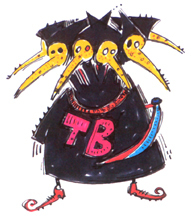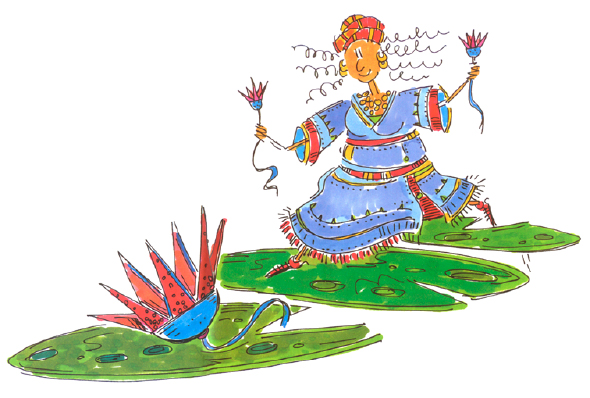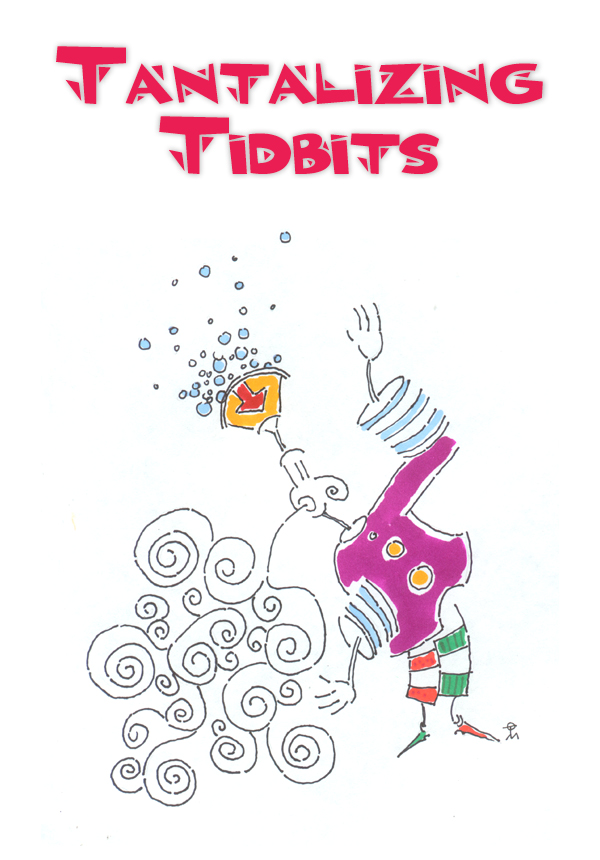Don’t “panic” at the “scope” of this chapter. Read it through with “enthusiasm” and you will ultimately “astonish” and “tantalize” your friends with your descriptive vocabulary.
Abominable
The ancient Romans did not look forward to an omen or a sign of a future event, since it often foretold evil. Hence, the adjective “abominable” (meaning “loathsome” or “unpleasant”) appropriately traces its roots to the Latin preposition ab (“away from”) and the Latin noun omen (“sign of future events or happenings”).
Achieve
This commonly used English verb traces its roots to the Latin phrase ad caput venire, “to come to a head or peak” or “to end.” In ancient times the Romans occasionally used this expression when referring to death and dying since, at that point, a person’s life does come to an end. The early French translated this phrase into their language as venir à chief. In time these three words blended together to form the French verb achever, “to finish,” which later passed into English as “achieve.” Until as late as the 16th century and the time of the English playwright William Shakespeare (1564–1616), “achieve” still connoted the idea of “to die” or “to kill.” Gradually it assumed its present meaning, which is “to bring to successful conclusion,” “to perform,” or “to attain.”

The first person under the age of 18 to win a gold medal in the Olympics was the coxswain of the Netherlands at the 1900 games in Paris, France. The coxswain sits in the back of a shell (a long, narrow, thin-hulled racing boat) and calls out the rowing rhythm for the crew.
Agony
The Greeks used agonia to denote an athletic contest and agon to refer to the place where the contest was held. Since the majority of participants in athletic contests lose their bid for first prize, agonia gradually came to mean “heartbreak” and “intense suffering,” both mental and physical. The word became “agony” in English.
Ambitious
The Latin word ambitio meant “going around” and is from ambi (“around” or “on both sides”) and itus (“having gone”). In everyday speech, the Romans used ambitio to refer to politicians who made the rounds soliciting votes. Through the centuries, English adapted the meaning to refer to any individual who exhibits a strong desire to succeed.
Anecdote
By definition, “anecdote” is a biographical or historical fact that is little-known and amusing. Its roots are the Greek prefixes an (“not”) and ek (“out”) and the Greek verb didonai (“to give”). Thus, an anecdote literally means something not given out, or something unpublished.

Invention Anecdote: The first slide fastener was invented in 1893 and exhibited at the World’s Fair that same year by Whitcomb Judson. In 1913, the device gained teeth and became what we now know as a zipper.
Aroma
An aroma is a pleasant odor or fragrance. English borrowed the term from the Old French aromat, meaning “sweet spice.”

Asterisk
The star-shaped symbol the asterisk is used to indicate additional information, a footnote, or an explanation somewhere relatively close or on the same page. “Asterisk” traces its roots to the Greek nouns aster (“star”) and asteriskos (“little star”).
Astonished
An astonished person is one who is surprised or amazed. Yet this word originally had a stronger meaning. “Astonished” actually means “thunderstruck.” It derives from two Latin words: the preposition ex, meaning “out,” and the verb tonare, meaning “to thunder.”
Auspicious
The Etruscans and Romans believed strongly in divination, the art of foretelling events. It was common practice to watch the actions of birds and from them predict whether a proposed undertaking should be approved or denied. To name the religious people in charge of watching and interpreting the flights of birds, the ancients combined their noun avis (“bird”) and verb spectare (“to watch”) to form auspices. What the auspices did was called auspicium. English later borrowed auspices and made it into the adjective “auspicious,” meaning “favorable” in the sense of “a good sign.”

The Romans believed that the gods communicated their will and desires through oracles, strange sights, events, and coincidences—such as the flight patterns of birds.
Beauty
The Romans used the adjective bellus to describe something that was beautiful. But bellus meant more than beautiful to the Romans, for they had adapted their adjective benulus to form bellus. Benulus was derived from bonus, the Latin adjective for “good.” Hence, bellus implied that if something were beautiful, it should also be good. The early French adapted bellus to form the adjectives beau (masculine) and belle (feminine), meaning “fine” and “beautiful.” The English changed the French word and formed “beauty.”

Aphrodite was the Greek goddess of love and beauty. The Romans knew her as Venus.
Candice
The Meroitic (from Meroë in Nubia) word for queen is kandake, and has come down to us as the girl’s name “Candice.”
Companion
This English noun traces its roots to two Latin words: the preposition cum, meaning “with,” and the noun panis, meaning “bread.” Thus, a companion originally was someone with whom you shared your bread or food, especially while traveling or in military barracks. Related to companion is the English word company, which still, by definition, refers to individuals who share food and/or conversation socially.
Consider
Seeking the advice of gods and goddesses before embarking on any important venture was a common practice in the Greek and Roman worlds. One way to do so was by observing the movement and alignment of constellations and planets. To describe these consultations, the Romans used the verb considerare, a combination of the preposition cum (“with”) and the noun sidus (“constellation”). Since interpreting the stars required much thought and careful observation, considerare soon acquired a second meaning—“to look at closely.” It is this second meaning that came into English as the definition of the verb “consider.”

The Greek astronomer Hipparchus of Rhodes compiled the first known catalog or list of the stars around 127 b.c.
Delirious
“Delirious” is defined as “wildly excited” or “rambling and raving incoherently.” It literally means “away from the furrow,” and traces its roots to the Latin adjective delirius (“silly” or “crazy”). To refer to people who seemed out of their senses, the ancient Romans combined the preposition de (“away with”) with lira, their noun for “furrow” or “row.” Anyone who acted in a bizarre manner was like a farmer who plowed outside the furrows in a field.
Desire
“Desire” traces its roots to the Latin noun sidera, meaning “stars.” De is a Latin preposition meaning “from” and is often used as a prefix. In English, “desire” means “to want,” a definition that implies a person is lacking something—that is, he or she is away from his or her lucky stars.

Elizabeth Blackwell finally found her “lucky stars” in 1848. After numerous rejections, Blackwell was accepted by Geneva Medical College in New York to fulfill her desire to be the first woman in the United States to graduate from a medical school.
Diehard
The British 57th Regiment of Foot, known as the Die Hards, had a reputation for fierce loyalty, due mostly to its commanding officer. At the Battle of Albuera in 1811, the officer, though wounded, cried out to his men, “Die hard, 57th, die hard.” During the Sepoy Rebellion in India in 1857–58, the soldiers of the 57th again proved their loyalty in a critical battle. The term soon moved beyond the battlefield to describe a very stubborn person.
Disaster
A compound of the Latin prefix de, meaning “apart” or “away from,” and aster, meaning “star,” “disaster” literally refers to an event that occurs when the stars are out of their proper sequence.

One of the great disasters of the Roman Empire was the Great Fire in the year 64. It ravaged almost three-quarters of Rome, the empire’s capital, and went on for nine days and nights.
Enthusiasm
This noun actually has religious roots. A combination of the Greek prefix en (“in”) and the Greek noun theos (“god”), “enthusiasm” originally referred to someone who was inspired or possessed from within by a god. This person was usually a fanatic, someone whose adherence to religious belief went beyond the reasonable. In time, this meaning was lost and enthusiasm came to mean “a feeling of intense interest or great eagerness.”
Excerpt
An excerpt is a passage or quotation selected from a book, article, or other source. It is a derivative of the Latin preposition ex, meaning “out of,” and the Latin participle carptum, meaning “picked” or “chosen.”
Expert
Used both as an adjective and a noun to denote someone highly skilled in a particular field, “expert” traces its roots to the Latin verb experiri, meaning “to put to the test” or “to know by experience.” Experiri, in turn, traces its roots to the Latin adjective peritum (“skillful”) and the Latin noun periculum (“danger”). Thus, experts are people who prove their skill in a field after being put to the test under circumstances that may involve danger.

Glamour
That “grammar” and “glamour” can be related seems hardly possible, but the two words do have the same root: the Greek noun gramma, meaning “letter.” It is only in recent history that reading has become widespread. Even as recently as the mid-1500s, few people in Europe had learned to read or write. As a result, words seemed mysterious and magical to most people. Those who did read knew Latin, which had become one of the world’s international languages. However, as the decades passed, fewer and fewer people knew or studied the rules of Latin grammar. Consequently, the ability to converse in Latin often was associated with black magic. During the Middle Ages, English used the term gramarye to mean “magic.” In time, the letter “r” changed to “l.” This new derivative, glamarye, first meant “magic,” “spell,” or “charm.” Gradually, it lost its close association with black magic and came to mean the “captivating charm a particular person possesses.”

Even in ancient Greece glamour was a must. Women used psimythion (white lead) to whiten their faces, rouge from plants to highlight their cheeks, and kohl to darken their eyelids.
Hazard
“Risk,” “chance,” and “danger”—these three words all define the English term “hazard.” Its roots do the same, since hazard traces its origin to the Arabic article al (“the”) and the Arabic noun zahr (“die”). Throwing dice (the plural of “die”) involves chance and the unknown. Other languages also adapted al-zahr. For example, in Spanish it became azar, “an unexpected accident.”
Hearse
Iron candelabra-type forms that were used in past centuries to hold candles in churches resembled the hirpex, which is the Latin word for “a large rake.” The French adapted the word to herce and it was applied to the frame supporting funeral candles and then to the vehicle that carries the coffin to the gravesite.
Heckler
A heckler is someone who harasses and annoys another person with questions or scornful remarks. The link to the original meaning of the word is obvious once you know that in the 13th century a heckle (also spelled “hackle”) was an instrument used to untangle, separate, and straighten fibers of flax (used for making linen) and hemp (used for making rope). To heckle the fibers was actually to tease them so that they might act as the worker wished.

Hectic
The ancient Greeks used their verb exein (“to have” and “to hold”) as the root of the noun hexis, meaning “something that was held or done again and again” or “a habit” and the adjective hektikos, meaning “habitual.” In time, hektikos came to refer to tuberculosis (also known as TB), a dreaded sickness that caused hot, dry skin, flushed cheeks, and a fever that kept recurring. English adapted hektikos to “hectic” and gradually modified the meaning to refer to feverish activity or action that is characterized by confusion and excitement.

Histrionics
In Latin, an actor was referred to as a histrio (the plural is histriones). Some etymologists believe that the Romans borrowed this term from the Etruscans, their neighbors to the north, who became subject to Roman authority in the fourth century b.c. While the Etruscan language has not yet been deciphered, the meanings of some words are known. It is believed that histrio is a form of the Etruscan hister, meaning “an individual who earns his living by amusing others with tricks, a clown.” In the 16th and 17th centuries, histrio and histrion were commonly used in English to designate an actor. Today, “histrionics” has contemptuous connotations and is generally used to express overreacting and affected behavior.

The Etruscans were the inhabitants of ancient Etruria, in central Italy, and established a thriving farming and commercial civilization that peaked in the 6th century b.c. They are also known for their realistic wall paintings.
Hypocrite
Oftentimes, as a word passes from region to region and generation to generation, its meaning changes considerably. Such was the case with “hypocrite.” Centuries ago, when the Greeks sought a word to represent the dramatic character on stage who decided what action to take or disputed what his fellow performers said, they joined the prefix hypo (“under”) with the verb krinein (“to decide” or “to dispute”). The result was hypocrites. Aware that an actor generally assumes the identity of someone other than himself, English borrowed the Greek term hypocrites and used it to represent any individual who pretends to be either better or different than his or her true personality.

The first theater in Athens was built between 550 and 534 b.c. The early theaters were originally designed to host festivals in honor of Dionysus, the god of fruitfulness and pleasure.
Hysteria
The ancient Greeks considered emotions and personality traits all related to what went on inside the body. Anything that differed from normal behavior was attributed to a particular organ, an organic change, or an imbalance of the fluids that make up the body. Women were considered more emotional than men. The ancients attributed a woman’s fickleness to the fact that she had a womb. The Greek term for womb was hystera, and the term for the emotional condition was hysterikos. Today, our derivative “hysteria” is not associated with men or women. It simply describes any outbreak of wild emotion.
Idea
This English noun is actually a form of the Greek verb idein, meaning “to see.” The ancients first had used idein to signify a “look,” “form,” or “outward appearance.” As a result of the beliefs of the Greek philosopher Plato (427–347 b.c.), however, “idea” began to refer more to a person’s conception of what was to come—that is, a person looked something over to see what it meant. Since the picture conceived in one’s mind is usually better or of a more perfect nature than the actual object or fact, “idea” came to signify a thought or mental image. An English derivative of this Greek term is the word ideal, meaning “the perfect model.”

Plato founded the Academy in Athens. Its pupils became some of Greece’s most influential thinkers and statesmen. The Academy remained open for more than 900 years.
Idiot
The ancient Greeks referred to a private person, that is, a person who held no public office, as an idotes. Gradually, the term came to mean “a foolish or stupid person.” Scientifically, “idiot” refers to someone whose mental ability is equivalent to or less than that of a two-year-old.
Innocent
This adjective traces its roots to nocens, the present participle of the Latin verb nocere, meaning “to harm.” In is the prefix used by the Romans to indicate the negative of the term that followed. Hence, in plus nocere means “not to harm.”
Intrigue
When the Roman comic writer Plautus used the Latin verb extricare in a play, it meant to unravel the story or the plot. To form this term, the Romans had combined their preposition ex (“out”) with their noun tricae (“trifling nonsense” or “troubles”). Tricae was, in turn, a derivative of the Greek trichos meaning “hair.” The fact that anything that becomes entangled in hair is difficult to extricate must have contributed to trichos and tricae becoming the root for intricare, from which the French formed their verb intriguer. The French, however, altered the meaning by introducing the idea of secrecy, a concept which our English form of “intrigue” still retains.

The “king of intrigue” was Sir Arthur Conan Doyle of England, the author of the Sherlock Holmes detective series.
Inundate
The English language combined the Latin noun unda (meaning “wave”) with several Latin prepositions to form a variety of words. Unda plus in (“on”) formed “inundate,” meaning “to deluge” or “to flood.” Unda plus re (“again”) formed redundant, meaning “to flow or speak more than is necessary.” Unda plus ab (“away”) formed abundant, meaning “flowing away, plentiful.”
Jeopardy
The Latin noun iocus meant “a joke,” “a jest,” or “a game.” In time, the Romans coined the phrase jocus partitus to designate a drawn game, or a game that is even or tied. The French adopted the phrase, changed the spelling to jeu parti, and used it to represent evenly matched opponents as well. Since the outcome of a game that is tied or whose players are equally skilled is uncertain, jeu parti, gradually came to mean “uncertainty.” English changed the French phrase to “jeopardy” and used it first in chess and other similar games. Time, however, strengthened the connotation of uncertainty to such an extent that “in jeopardy” has come to mean someone in extremely serious danger.

Many of us know Jeopardy as a time-tested quiz show. However, the very first quiz show aired on CBS TV on February 2, 1950. It was titled What’s My Line?
Jovial
In early Roman mythology, Jovis was the king of the gods. His name later changed to Jupiter, a compound of Jovis and pater, the Latin noun for “father.” In honor of the all-powerful god, ancient astronomers named the largest planet in the solar system Jupiter. After astrologists noted that individuals born under Jupiter’s sign were happy and joyful, etymologists thought it fitting to use “jovial” to mean “genial” or “of good humor.”
Laconic
The people of Sparta were widely known throughout the ancient Mediterranean world for their frugal ways. They never wasted anything, not even words. Ancient writers often referred to the Spartans as “Laconians,” because Sparta was the chief city of the district of Laconia. In one account, a writer told of an Athenian envoy sent to Sparta with the message, “If we come to your city, we will destroy it.” The Spartan reply was, “If.” When speakers of English wanted an adjective that would convey the idea of speaking bluntly and with few words, they borrowed the name Laconia and formed the English term “laconic.”
Nausea
Seasickness has plagued travelers for thousands of years. The ancient Greeks used the noun naus, meaning “ship,” to form nausia, the Greek noun denoting the woozy feeling seasick people experience. Naus and navis, the Latin word for “ship,” have become the root of several English seafaring terms, including nautical (“of or relating to ships, shipping, or sailors”), navigate (“to plan or control the course of a craft”), and navy (“a group of ships”).
Obituary
Newspapers carry death notices accompanied by brief biographies of people. In English, this type of column is called an obituary. The term is a direct derivative of the Latin participle obitum, which means “having gone over.”

Optimist/Pessimist
“Optimist” traces its roots to optimus, meaning “best.” “Pessimist” traces its roots to pessimus, meaning “worst.” An optimist always anticipates the best in any situation while a pessimist prepares for the worst.
Panic
The ancient Greeks believed that a woodland deity named Pan enjoyed making horrible noises, especially at night, to frighten people. They called the fear he caused deima panikon, meaning “Panic fear.” In English, “panic” is used to describe a sudden, overwhelming fear that has no basis.
Persecute
This Anglicized form of the French verb persécuter is a combination of the Latin preposition per (“through”) and the participle secutus (“followed”). To persecute someone is to harass that person constantly, especially for religious, political, or racial reasons.
Phineas
In the Bible, the grandson of Aaron and the son of Eli both have the name Phineas. Egyptologists believe that the root of “Phineas” is an Egyptian proper name frequently used during the New Kingdom (c. 1570–1070 b.c.), Paneshsy, meaning “the Nubian.” The name became very popular in 17th-century England.
Phobia
Derived from the Greek noun phobos, meaning “fear,” “phobia” refers to an exaggerated and unexplainable fear of something. To name a specific fear, English often combines “phobia” with a variety of other prefixes, many of which are also Greek words. Acrophobia (akros is Greek for “height”) means a fear of great height. Agoraphobia (agora is Greek for “assembly place” or “marketplace”) is a fear of crossing or being in the middle of open spaces. Claustrophobia (claustrum is Latin for “an enclosure”) is a fear of being in a closed room or narrow space. Hydrophobia (hydor is Greek for “water”) is a fear of water. Pyrophobia (pyr is Greek for “fire”) is a fear of fire.
Pyre
While every language has terms and phrases peculiar to its own vocabulary or to a particular region where a dialect is spoken, a form to express the concept of fire exists in every language. In Greek, the word is pyr, which has become the basis for several English words. A pyre is a combustible heap, often of wood, used for burning a dead body as a funeral rite. Empyreal pertains to the highest heaven, which was once thought to consist of fire and light. Pyretology is the branch of medicine that treats fevers. Pyrex is a trademark applied to a variety of glassware that is resistant to heat, chemicals, and electricity. Pyromania is the uncontrollable impulse to start fires (mania is Greek for “madness”). Pyrosis is a disorder of the stomach, or heartburn.
Quixotic
The Spanish novelist Miguel de Cervantes (1547–1616) named his chief work after its main character, Don Quixote. Quixote tried to be the perfect knight, but he was far too idealistic and impractical and, as a result, behaved foolishly. English borrowed his name, made it an adjective—“quixotic”—and used it to refer to any person who behaves like Don Quixote.

Résumé
The French use résumé to connote “a summary” or “a summing up of ideas.” The English definition is basically the same. However, in English, a résumé generally refers to the written profile of the significant history and achievements in a person’s life. This profile is kept updated and submitted whenever a person applies for a job or a promotion. The term traces its roots to the Latin prefix re, meaning “back” or “again,” and the Latin verb sumere, meaning “to take.”
Rigmarole
Today, “rigmarole” means “foolish talk or time-wasting procedures that do not make sense.” While its exact origin is uncertain, its history is linked to the 1290s when King Edward I of England took control of Scotland and had the nobles and landowners sign a document pledging their allegiance to him. This document was known as a ragman roll (why is not known). As the lists of names were hurriedly obtained, not all the writing was legible. Nor was the document in good order. The phrase “ragman roll” soon came to mean “a jumble of words.” In time, it was corrupted to “rigmarole.”

Scapegoat
Today a scapegoat is a person who is made to take the blame for a crime or mistake committed by another person. In ancient times, for members of the Jewish faith, a scapegoat was an actual goat. According to the law of Moses, during the festival of Yom Kippur two goats were led to the altar of the tabernacle. Lots were cast to see which goat was to be sacrificed and which goat was to be the scapegoat. The high priest would then confess the sins of the people over the scapegoat’s head before it was allowed to escape into the wilderness carrying all these sins on its head.
Scent
“Scent” is from the Old French verb sentir, meaning “to feel.” It describes a fragrance or perfume.
Scope
The dictionary defines “scope” as “the range of understanding.” The term is from the Greek verb skopein, meaning “to look attentively.” In English, it is often combined with other Greek terms to form many words. A horoscope (horo is Greek for “hour” or “season”) is an astrological forecast of a person’s future based on a diagram of the planets and stars. A kaleidoscope (kalos is Greek for “beautiful” and eidos is Greek for “form”) is an optical instrument that offers constantly changing patterns by rotating the bits of colored glass inside it. A microscope (mikros is Greek for “small”) is an optical instrument used to magnify images of small objects. A telescope (tele is Greek for “far off”) is an optical instrument used to help a person see something at a distance.
Susan
This feminine proper name has deep roots. English borrowed the Latin name Susanna, which was the Latinized form of the Greek Sousanna. The latter appears as the name of the wife of Joakin, ruler of Judah, in an early Greek translation of the Bible. The Greek spelling was an adaptation of the Hebrew Shushanna, the feminine form of shushan. The meaning of shushan can be traced to the Egyptian word for the lotus flower, shoshen. The Egyptians highly prized the beautiful, sweet-smelling blue lotus, and shoshen became the root of the flower’s name in several Eastern languages. In Greek, it was souson.

Talent
For the ancient Greeks, the term talanton represented a specific weight and monetary unit whose estimated value varied, as does the value of our currency today. The Romans later adopted the Greek term and changed it to talentum. Its present significance came as a result of a story found in the New Testament. According to Matthew 25: 14–46, a man distributed his goods among his servants: “to one he gave five talents; to another two; and to another one; to every man according to his abilities.” Hence, “talent” now means “superior intelligence and ability” and “a natural capacity or gift.”

Some say that U.S. athlete Jim Thorpe (1888–1953) was the most talented all-around athlete in history. He won the pentathlon and the decathlon at the 1912 Olympic Games, and, in 1950, the Associated Press named him the greatest U.S. athlete in the first half of the 20th century.
Tantalize
The ancient Greeks believed that Zeus punished any god or super-human who abused his own powers or the powers of his fellow deities. Tantalus, the king of an area in Asia Minor (present-day Turkey), was one such person. Zeus confined Tantalus to a pool of cool, refreshing water surrounded by fruit trees. The beautiful setting deceived Tantalus. Whenever he went to drink the water, it receded. Whenever he reached for the luscious fruit hanging above his head, it, too, moved beyond his reach. Thus Tantalus gave his name to “tantalize,” meaning “to tease” by not allowing someone to have what he or she wants even though it is readily available. See also tantalum.

The Romans identified many of the Greek gods with their gods. Sometimes, they kept the Greek name, as with Apollo. Other times, they used the Roman name. The Greek god Zeus was the Roman god Jupiter.
Vernacular
The Latin noun verna, which may be Etruscan in origin, was commonly used in ancient times to designate “a slave born in his master’s house.” The adjective vernacula gradually came into use to refer to anything pertaining to such a slave. In time, it came to mean “domestic” and was used with the Latin noun vocabula, meaning “name.” Gradually, the meaning of the phrase vernacula vocabula changed to “native languages.” Then, sometime later, vocabula was dropped and vernacula became “vernacular,” a term used primarily to refer to native languages or dialects.
Victoria
The proper name “Victoria” is actually a Latin word that means “victory.” To form victoria, the Romans adapted their noun victor, Latin for “one who conquers.”
